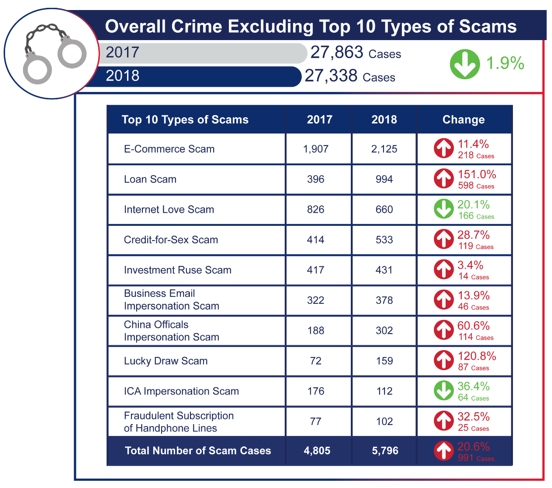
M Update, 21/2/2019 – Singapore’s streets remain safe even at night, but the Internet remains a lawless place.
The Singapore Police Force (SPF) said on Wednesday (Feb 20) that loan scams, usually conducted via WhatsApp and other messaging platforms, saw the largest increase last year. Other technology-enabled crimes such as credit-for-sex and e-commerce scams are also on the rise.
Annual data released by the police showed that there were 33,134 reported crimes last year, an increase of 1.4 per cent from the 32,668 cases in 2017. This is fuelled by a 20.6 per cent jump in scams conducted online or on the phone.

The total amount cheated from these scams fell from S$170 million in 2017 to S$158 million last year. Excluding cases from the top 10 types of scams, however, the total number of reported crimes in Singapore fell by 1.9 per cent to 27,338 cases last year.
SCAMS TO WATCH OUT FOR
1. Loan scams
Loan scam cases shot up by 151 per cent to 994 cases last year. A total of S$2 million were lost to cheats, increasing nearly four times from 2017’s figures.
A common approach is when the perpetrator sends unsolicited messages on chat platforms such as WhatsApp to offer loan services, and the victim who responds would be instructed to transfer money as a deposit before the loan can be disbursed. After the money is transferred, the perpetrator can no longer be reached.
2. Impersonation scams by people pretending to be officials from China
Such cases increased by more than 60 per cent to 302 cases last year. The total amount cheated fell slightly from about S$12.8 million in 2017 to about $12.7 million last year. The largest amount cheated in a single case was close to S$1.7 million.
Usually done over the phone, the caller speaks in Mandarin to tell victims that they were involved in crimes such as money laundering. Claiming to be an official from China, the caller would demand from victims their personal and bank account details for “investigations”, but the information given would be used to perform unauthorised transactions, with the victim losing money in the process.
3. Credit-for-sex scams
These cases went up by nearly 30 per cent to 533 last year.The total amount cheated went up by 50 per cent to about S$1.5 million. The largest amount cheated in a single case was close to S$100,000. The culprit typically befriends the victim through chat platforms such as WeChat, and asks for a purchase or gift card from the victim in exchange for sexual favours, a meet-up or a date.
4. E-commerce scams
These scams increased by 11.4 per cent to 2,125 cases last year, with 70 per cent of them happening on online marketplace Carousell. Victims were most commonly cheated when buying electronic products and tickets to events and attractions, such as tickets for Universal Studios Singapore. The total amount cheated rose to about S$1.9 million, up from about S$1.4 million in 2017 — a 35.7 per cent jump. The largest amount cheated in one case was close to S$69,000.
A “significant proportion” of online crimes were committed remotely by foreign syndicates, the police said, adding that they will continue to work closely with foreign law enforcement agencies to crack down on such gangs that target Singaporeans.
Mr David Chew, director of SPF’s Commercial Affairs Department, said: “Crime has moved with the consumers. As tech-savvy consumers move online… criminals, too, have also joined this community. While the Internet enables us to buy almost anything from anywhere at any time, the same technology enables online criminals to purvey their scams to unsuspecting victims from anywhere in the world or prey on unsuspecting Singaporeans.”
Major online shopping platforms such as Carousell are working with the police to protect buyers, such as introducing escrow payment options — allowing payment to be withheld until the sale is acknowledged by both parties.
OTHER AREAS OF CONCERN
Apart from scams, the police also highlighted the rise in cases under the Computer Misuse Act, as well as the increase in outrage of modesty cases and reports of harassment by unlicensed moneylenders.
- Computer misuse cases increased by about 40 per cent to 1,204 last year. These included phishing and WhatsApp “takeover” scams, where victims lose access to their accounts and these compromised accounts would be used to deceive their contacts into buying gift cards.
- Outrage
of modesty cases rose by about 12 per cent to 1,747 last year. Those
that happen on public transport and at entertainment night spots remain
key concerns, the police said.
Last year, there was a 34.3 per cent increase of such cases in entertainment night spots. Those occurring on public transport fell by 2.4 per cent but these still accounted for more than 10 per cent of such cases. - Cases of harassment linked to unlicensed moneylending activities went up by about 20 per cent to 4,619 cases last year.
There was also a 33.5 per cent jump in harassment by electronic means such as on social media and SMS, with these instances forming the bulk of such cases reported last year.
The police noted that more foreign workers are increasingly borrowing money from unlicensed moneylenders, so they have engaged maid employment agencies and businesses to educate these workers against borrowing from loan sharks.
Even though efforts to put up police cameras in neighbourhoods have forced unlicensed moneylenders or their runners to change to non-confrontational and less damaging tactics, such as placing harassment notes in letterboxes, the police said that the proliferation of new communication platforms and smartphones has made it easier for debtors to be harassed through electronic means and for larger groups of people to be targeted.
IMPROVEMENTS
Despite the general rise in online crime, theft and related crimes fell by 8.6 per cent, with 12,279 cases reported last year. These included theft at shops, as well as motor-vehicle and bicycle theft. The decline in these cases can be largely attributed to increased police presence at malls and other crowded places, for example. The police said that they have also been engaging shop owners to enhance security coverage with surveillance cameras, set up anti-shop-theft gantries and put up crime prevention posters. In efforts to prevent crimes, the police encourage members of the public to lend their support by providing crucial information via i-Witness, on the Police@SG mobile application or via the SPF website.
Sources : Todayonline.com














